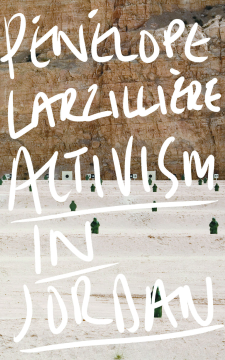
Additional Information
Book Details
Abstract
In Jordan, between censorship, repression and election rigging, political activism is limited – despite the democratic opening glimpsed in 1989. In this important new book, Pénélope Larzillière charts the path of longstanding activists in Jordan and shows how opposition movements there have shifted from the underground to a heavily controlled public sphere. Activists discuss their motivation and commitment and the consequences their activism has had throughout their lives. Not only do these accounts highlight the general conditions for political activism in a repressive regime, they also unpack the meaning individuals attach to their political journey and chosen ideology, whether communist, nationalist, Islamist or otherwise.
'A fascinating read… a valuable contribution to the literature on what is a vast topic, and has simplified it in such a way that not only covers important aspects but also does them justice in a very satisfying way.'
Middle East Monitor
'[T]his very readable work is an important contribution to the literature on political activism and contentious politics in non-democratic settings.'
Choice
‘Larzillière’s book sheds light on youth activism in Jordan, the theatre of one of the least studied components of the revolutionary wave that shook the Arab region in 2011. In so doing, it offers a most useful contribution to both the study of Jordanian politics and the analysis of the ongoing upheaval.’
Gilbert Achcar, author of The People Want: A Radical Exploration of the Arab Uprising
‘An essential book for understanding Jordan’s key role as a stabilizing force in a chaotic Middle East.’
Denis Bauchard, former French ambassador to Jordan
‘Larzillière’s insightful book presents refreshing perspectives on the mobilization and demobilization of Islamist and left-wing movements in Jordan and the Arab world.’
Hamit Bozarslan, School for Advanced Studies in the Social Sciences (EHESS)
Pénélope Larzillière is senior research fellow at the Institute for Research on Development (IRD-CEPED, Paris), and associate fellow at the School of Advanced Studies in Social Sciences (CADIS-EHESS). Her research focuses on political commitment, activism and ideologies, specializing in the Middle East. Her previous books include To Be Young in Palestine (Balland, 2004). She has also co-edited the journal issues 'Révolutions, contestations, indignations' (Socio, 2013) and 'Faut-il désoccidentaliser l’humanitaire?' (Humanitaire, 2010).
Table of Contents
| Section Title | Page | Action | Price |
|---|---|---|---|
| Cover | cover | ||
| Halftitle | i | ||
| About the author | ii | ||
| Title page | iii | ||
| Copyright | iv | ||
| Contents | v | ||
| Acknowledgements | vii | ||
| Introduction | 1 | ||
| Arenas of activism | 5 | ||
| Ideology and commitment | 8 | ||
| 1. The Jordanian Regime | 11 | ||
| The Palestinian question | 14 | ||
| The limits of the 1989 open policy | 16 | ||
| Towards authoritarian liberalism | 18 | ||
| The Muslim Brotherhood: a co-opted opposition? | 20 | ||
| The repercussions of the Syrian crisis | 25 | ||
| 2. Becoming an Activist | 30 | ||
| A sense of injustice: poverty and the Palestinian cause | 32 | ||
| Mentors | 36 | ||
| The political currents and their major figures | 41 | ||
| Opportunities for friendship, leisure activities and emancipation | 44 | ||
| 3. The Student Experience | 50 | ||
| Local hegemonies and waves of membership | 53 | ||
| Arab universities, curricula and armed struggle | 55 | ||
| Crackdowns on the communists, and internal divisions | 60 | ||
| Islamist mobilization in universities | 65 | ||
| Social leaders | 69 | ||
| 4. Activism, a Way of Life | 73 | ||
| Communist marginality | 74 | ||
| The Islamist foothold | 82 | ||
| Work and activism | 88 | ||
| 5. Repression and Dissidence | 96 | ||
| Nationalists and communists: impossible and necessary underground activity | 96 | ||
| Authoritarian elections | 104 | ||
| Repression and legitimacy | 106 | ||
| 6. Professional Activism as an Alternative | 110 | ||
| An alternative political arena | 113 | ||
| The professions mobilize for the Palestinian cause | 115 | ||
| A limited space | 119 | ||
| Union engagement | 122 | ||
| 7. New Forms of Mobilization | 131 | ||
| Expert activism and project-oriented mobilization | 132 | ||
| Activist career changes: old activists, new activism? | 140 | ||
| The Arab Spring mobilizations of 2011 and 2012: issues and limits | 146 | ||
| The end of ideologies? Rise and decline of “grand narratives” | 154 | ||
| 8. Disillusioned Islamists | 158 | ||
| Youssef: a post-Islamist trajectory | 159 | ||
| Asma: politics through satire and reform through education | 167 | ||
| Ibrahim: from Islamism to the left | 173 | ||
| Conclusion | 180 | ||
| Methodological Appendix | 189 | ||
| Questions of position | 189 | ||
| Questions of methodology | 192 | ||
| Sociodemographic data on the activists interviewed | 198 | ||
| Notes | 203 | ||
| Introduction | 203 | ||
| Chapter 1 | 203 | ||
| Chapter 2 | 206 | ||
| Chapter 3 | 209 | ||
| Chapter 4 | 210 | ||
| Chapter 5 | 212 | ||
| Chapter 6 | 213 | ||
| Chapter 7 | 216 | ||
| Chapter 8 | 219 | ||
| Conclusion | 219 | ||
| Methodological Appendix | 220 | ||
| Bibliography | 222 | ||
| Index | 232 |
